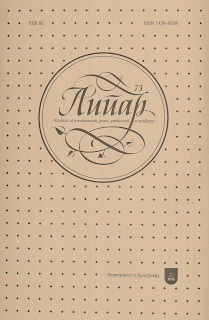ОДБРАНА ПОЕЗИЈЕ: РУСКИ ФОРМАЛИЗАМ И НОВА КРИТИКА
DEFENCE OF POETRY: RUSSIAN FORMALISM AND NEW CRITICISM
Author(s): Jovana PavićevićSubject(s): Language and Literature Studies, Studies of Literature, Comparative Study of Literature, Russian Literature, Serbian Literature, Theory of Literature, British Literature
Published by: Универзитет у Крагујевцу
Keywords: technique;остранение;zaum;poetry;close reading;criticism;paradox;metaphor;value;communication
Summary/Abstract: The paper aims to present the key concepts that two formalist schools of thought developed in order to defend poetry as a miracle of communication. Russian Formalism takes Shklovsky’s defamiliarization (остранение) as its key concept and the trans-sense language (zaum) of Russian Futurist poets as a basis for analysing what constitutes differentia specifica of poetry. The ideas of the Russian formalist school, through Roman Jakobson, spread first to Eastern Europe, and then to the United States of America, where they influenced a group of critics, who were already inspired by T.S. Eliot’s and I. A. Richards’ ideas on poetic language and communication, to develop a new critical methodology. The name “New Criticism” was supposed to indicate that this school of thought was about different approaches and new tendencies in criticism. As the paper demonstrates, the key representatives of New Criticism are particularly interested in exploring the function of poetry and of criticism as well as the nature of poetic imagination and language. In order to examine what the poem says as a poem, they developed the practice of close reading and focused on metaphor, paradox, and specific method by which a poet transforms his experience into a poem as autonomous features of poetic expression. The special terminology introduced by Russian Formalism and New Criticism, and the complex, ironic and intellectual language they used not only managed to throw light on what specific problems of the science of literature were, but also enabled a defence through poetry – a kind of resuscitation and refinement of non-literary reality.
Journal: Липар - часопис за књижевност, језик, уметност и културу
- Issue Year: XXI/2020
- Issue No: 73
- Page Range: 89-100
- Page Count: 12
- Language: Serbian

